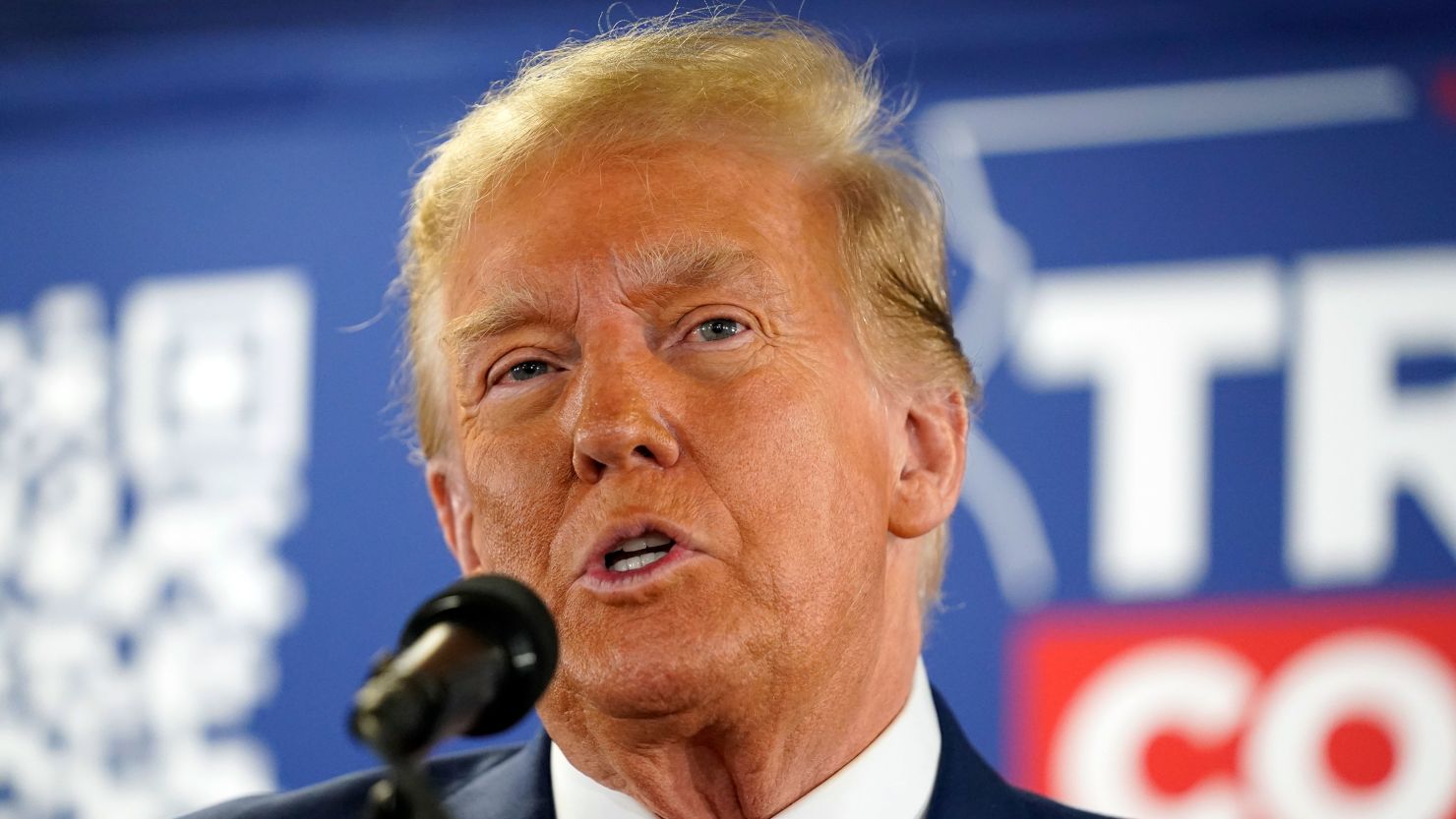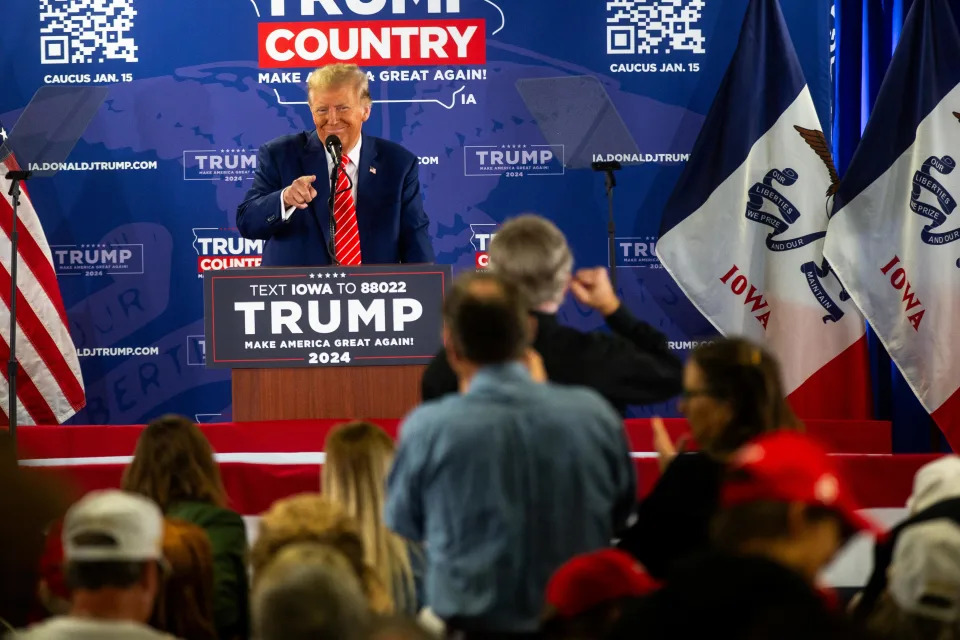
WASHINGTON — Former President Donald Trump at a campaign stop in Iowa said America’s Civil War could have been “negotiated,” a comment that drew immediate backlash from civil rights groups and historians alike.
On the third anniversary of the Jan. 6, 2021, Capitol riot, Trump on Saturday called the Civil War, which began in 1861, “fascinating” and “horrible.”
“So many mistakes were made,” Trump said. “See, there was something I think could have been negotiated, to be honest with you. I think you could have negotiated that. All the people died. So many people died.”
“Abraham Lincoln, of course, if he negotiated it, you probably wouldn’t even know who Abraham Lincoln was,” he added.
Trump’s remarks come just weeks after former South Carolina Gov. Nikki Haley failed to mention slavery as a cause of the Civil War in a town hall. At a different rally in Iowa, Trump attacked Haley over the response, saying “I’d say slavery is sort of the obvious answer.”
But Trump’s suggestion that the war could have been avoided sparked immediate criticism. Charles V. Taylor Jr., executive director of the Mississippi NAACP, told USA TODAY that “there is no negotiation with slavery.”
“Civil rights, human rights should never be negotiable,” Taylor Jr. said. “When Trump says things that are racially charged, and he says things that are polarizing, when he says things that are obviously offensive… what he says is just so egregious, but he is absolutely talking to a specific group of people and alienating another.”
‘These are not just dog whistles’
Svante Myrick, the president of People For the American Way, a progressive advocacy group, told USA TODAY Trump’s comments demonstrate a “glaring ignorance of American history.”
“By the time the Civil War broke out, there had been literally hundreds of years of negotiations around how, when and where to end slavery, and the southern states that seceded are what triggered the Civil War,” Myrick said. “And it seems like President Trump was implying that some sort of failure of diplomacy on behalf of Abraham Lincoln is what caused the Civil War.”
Myrick accused Trump’s comments of being “extremely appealing to Confederate sympathizers and white supremacist folks,” risking dialing up divisions across the country.
LaTosha Brown, co-founder of Black Voters Matter, agreed, saying Trump’s comments appeared aim at downplaying the enslavement of Black people in America’s history.
“We know the history of the South. We know that part of the elements of the South was centered around the institution of slavery and in maintaining that people of color would be in a permanent social status,” said Brown, accusing Trump of speaking “to those that still feel like their only advantage is white supremacy.”
Trump’s rhetoric on the campaign trail has grown more inflammatory as he seeks to clinch the Republican nomination and win back the White House from President Joe Biden. He said last month immigrants are “poisoning the blood of the country,” remarks Biden’s campaign likened to dictator Adolf Hitler.
Trump also drew comparisons to dictators last year when he described his political opponents as “vermin,” reminding many of Hitler and Italy’s Benito Mussolini.
“He’s getting more desperate and because he’s more desperate, I think he’s getting more bold,” said Brown. “He uses lies, he uses fear. He uses this insane concept of white superiority. He uses all of those things as a toolkit in his arsenal.”
Andrea Young, executive director of the American Civil Liberties Union of Georgia, said some of Trump’s comments have pointed to “the worst parts of our history.” She noted that Trump has promoted the false conspiracy theory that former President Barack Obama was born in Kenya, rather than Hawaii.
Taylor Jr. said 2024 will be a “crucial year” as the election will “chart a course in this country.”
“Black voters absolutely know the dangers of what Trump says and because he has been in office, we also know that these are not just dog whistles or just words to excite a particular group of voters,” Taylor Jr. said. “These are things that he believes and we know the consequences of him believing these ridiculous notions have a very negative impact on our democracy.”

What do historians say about the Civil War?
Historians told USA TODAY it’s absurd to blame Lincoln for not negotiating a preemption of the war.
By the time Lincoln took the oath of office on March 4, 1865, southern states had seceded from the country. Lincoln would never negotiate an agreement that included separation of the states, which he refused to accept or recognize.
Lincoln also made the decision to resupply federal facilities in the southern states, including Fort Sumter in the Charleston, South Carolina, harbor. South Carolina’s decision to attack the federal garrison at Fort Sumter on the early morning of April 12, 1861, little more than a month after Lincoln took office, triggered the military conflict.
David Blight, a Yale University history professor and author of “Race and Reunion: The Civil War in American Memory,” rejected Trump’s comments.
“It is really nothing more than fantasy with dark political aims – it’s history as bad, vicious entertainment,” said Blight, the Pulitzer Prize-winning biographer of abolitionist leader Frederick Douglass.
Historians also questioned how anyone could have negotiated with, essentially, a newly declared nation determined to maintain a slave economy.
Harold Holzer, a Lincoln scholar and the author of a forthcoming book titled “Brought Forth on This Continent: Abraham Lincoln and American Immigration,” said “no historian and no reader of history believes that a compromise could have reversed secession or averted a civil war over- yes – slavery.”
Holzer noted that, before Lincoln took office, “he was willing to guarantee the survival of slavery where it already existed, as long as the Union was restored and the extension of slavery forbidden.”
The South refused, he said: “The slave states would not return under a Republican president. Six weeks after Lincoln took office Confederate troops opened fire on the federal fort at Charleston.”
This article originally appeared on USA TODAY









